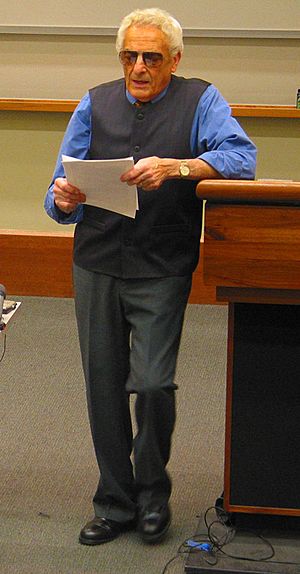A. James Gregor facts for kids
Quick facts for kids
A. James Gregor
|
|
|---|---|

Gregor lecturing at UC Berkeley in 2004
|
|
| Born | April 2, 1929 New York, New York, U.S.
|
| Died | August 30, 2019 (aged 90) |
| Alma mater | Columbia University, B.A., Ph.D |
| Awards | Order of Merit of the Italian Republic Guggenheim Fellowship (1973) |
| Scientific career | |
| Fields | Fascism Marxism Political science Race relations and Eugenics Epistemology |
| Institutions | University of California, Berkeley Marine Corps University University of Texas University of Hawaii |
Anthony James Gregor (born April 2, 1929 – died August 30, 2019) was a political scientist and professor at the University of California, Berkeley. He was well known for his studies on fascism, Marxism, and national security.
Contents
Early Life and Education
Gregor was born Anthony Gimigliano in New York City. His father worked in a factory. Gregor served as a volunteer in the U.S. Army.
He graduated from Columbia University in 1952. After that, he worked as a high school social science teacher. At the same time, he continued his studies to earn advanced degrees. He wrote articles for magazines like The European and Genus.
Studies on Human Populations and Philosophy
In 1959, Gregor helped start the International Association for the Advancement of Ethnology and Eugenics (IAAEE). He said this group wanted to allow open discussions about human differences. He also helped edit Mankind Quarterly, a journal for the organization.
During this time, he studied different groups of people in Australia, South Africa, and the southern United States. In 1961, he earned his doctorate degree from Columbia University. He then became a philosophy professor at the University of Hawaii from 1961 to 1964. Later, he taught at the universities of Kentucky and Texas. In 1967, Gregor joined the Political Science Department at the University of California at Berkeley. He stayed there until he retired.
Understanding Fascism
Gregor was one of many scholars in the 1960s who looked at Fascism in a new way. He believed that Italian Fascism was a serious political idea. He argued that it played a role in changing Europe. He called it a "developmental dictatorship." This means it was a strong government that aimed to develop a country quickly.
Since the 1970s, Gregor focused most of his research on fascism. This is what he is most known for. He wrote several books on the topic, including The Ideology of Fascism (1969) and The Fascist Persuasion in Radical Politics (1974). Other books include Mussolini's Intellectuals and Marxism, Fascism, and Totalitarianism.
Gregor noted that experts often disagree on what fascism truly means. He said that many revolutionary movements have shown traits similar to fascism. He also argued that fascism should not be simply called "right-wing extremism."
International Relations and Advice
Gregor believed in the American form of democratic liberalism. He thought it was the most effective way to govern. In the 1960s, he gave talks to encourage support for the U.S. role in the Vietnam War.
In the 1970s and 1980s, Gregor advised Ferdinand Marcos, who was the leader of the Philippines. Gregor suggested that the U.S. should support Marcos. He also downplayed claims of human rights issues, saying they were not proven.
He wrote books about relations between the U.S. and China. These include The China Connection (1986) and Arming the Dragon (1987). In 1989, he wrote In the Shadow of Giants, which was about the security of Southeast Asia. He also held a special teaching position at the Marine Corps University from 1996 to 1997.
Gregor translated some works by the Italian philosopher Giovanni Gentile into English. He also wrote about Gentile's political ideas. Until his retirement in 2009, he taught courses on revolutionary change, Marxism, and Fascism at UC Berkeley. His last project was a study of the big changes that happened in the twentieth century.
Awards and Recognition
Gregor received several important awards and honors:
- He was a national Guggenheim Fellow. This is a special award for people doing important research.
- He was a Senior Fellow at the Institute for Advanced Social Studies in Jerusalem.
- He was a professor at the Marine Corps University.
- He was made a Knight of the Order of Merit of the Italian Republic in Italy.
Many scholars recognized Gregor's work. Roger Griffin said Gregor wrote an important early study of fascism. Andreas Umland called Gregor one of the main people who shaped the study of fascism. Sean Kennedy noted that Gregor's ideas, like seeing Italian Fascism as a "developmental dictatorship," were very influential.
Books
- A Survey of Marxism: Problems in Philosophy and the Theory of History, 1965
- The Ideology of Fascism: the rationale of totalitarianism, 1969
- The Fascist Persuasion in Radical Politics, 1974
- Young Mussolini and the intellectual origins of Fascism, 1979
- Italian Fascism and Developmental Dictatorship, 1979
- The China Connection: U.S. policy and the People's Republic of China, 1986
- Arming the Dragon: U.S. Security Ties with the People's Republic of China, 1987
- The Faces of Janus: Marxism and Fascism in the Twentieth Century, 2000
- Giovanni Gentile: philosopher of fascism, 2001
- Mussolini's Intellectuals: Fascist Social and Political Thought, 2006
- Marxism, Fascism, and Totalitarianism: Chapters in the Intellectual History of Radicalism, 2008
- Marxism and the Making of China: A Doctrinal History, 2014
See also
 In Spanish: A. James Gregor para niños
In Spanish: A. James Gregor para niños
 | Leon Lynch |
 | Milton P. Webster |
 | Ferdinand Smith |

